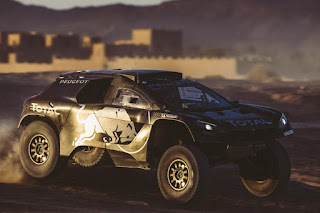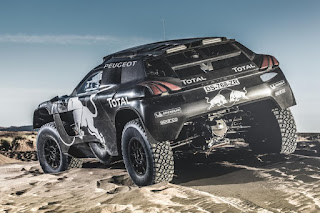On its Dakar Rally debut earlier this year, the Peugeot 2008 DKR didn't perform brilliantly. In fact, none of the team's three cars managed to finish in the top ten, thanks to a combination of reliability problems and accidents.
However, a just-announced overhaul could mean Peugeot is going to be much more competitive in 2016's event.
Now known as the 2008 DKR16, the car sticks with its unusual rear-wheel drive layout. A mid-mounted 3.0 litre V6 twin-turbo diesel engine is also retained, but power is up by 10 bhp (7 kW / 10 PS) to 345 bhp (257 kW / 350 PS).
Improving the balance between both axles was identified as a key objective. To help achieve this, the weight distribution has been altered and, due to a redesigned bonnet and roof-mounted air intake, aerodynamic downforce is better managed.
A modified double-wishbone suspension set-up is claimed to enhance agility, plus the front and rear overhangs are shorter than before. Furthermore, new one-piece 17” magnesium wheels shod with lighter Michelin tyres are fitted to reduce unsprung weight.
Related post:
The Peugeot 2008 DKR gets a new livery
However, a just-announced overhaul could mean Peugeot is going to be much more competitive in 2016's event.
Now known as the 2008 DKR16, the car sticks with its unusual rear-wheel drive layout. A mid-mounted 3.0 litre V6 twin-turbo diesel engine is also retained, but power is up by 10 bhp (7 kW / 10 PS) to 345 bhp (257 kW / 350 PS).
Improving the balance between both axles was identified as a key objective. To help achieve this, the weight distribution has been altered and, due to a redesigned bonnet and roof-mounted air intake, aerodynamic downforce is better managed.
A modified double-wishbone suspension set-up is claimed to enhance agility, plus the front and rear overhangs are shorter than before. Furthermore, new one-piece 17” magnesium wheels shod with lighter Michelin tyres are fitted to reduce unsprung weight.
Related post:
The Peugeot 2008 DKR gets a new livery



%2BFront%2BSide.jpg)



0 Comments:
Post a Comment